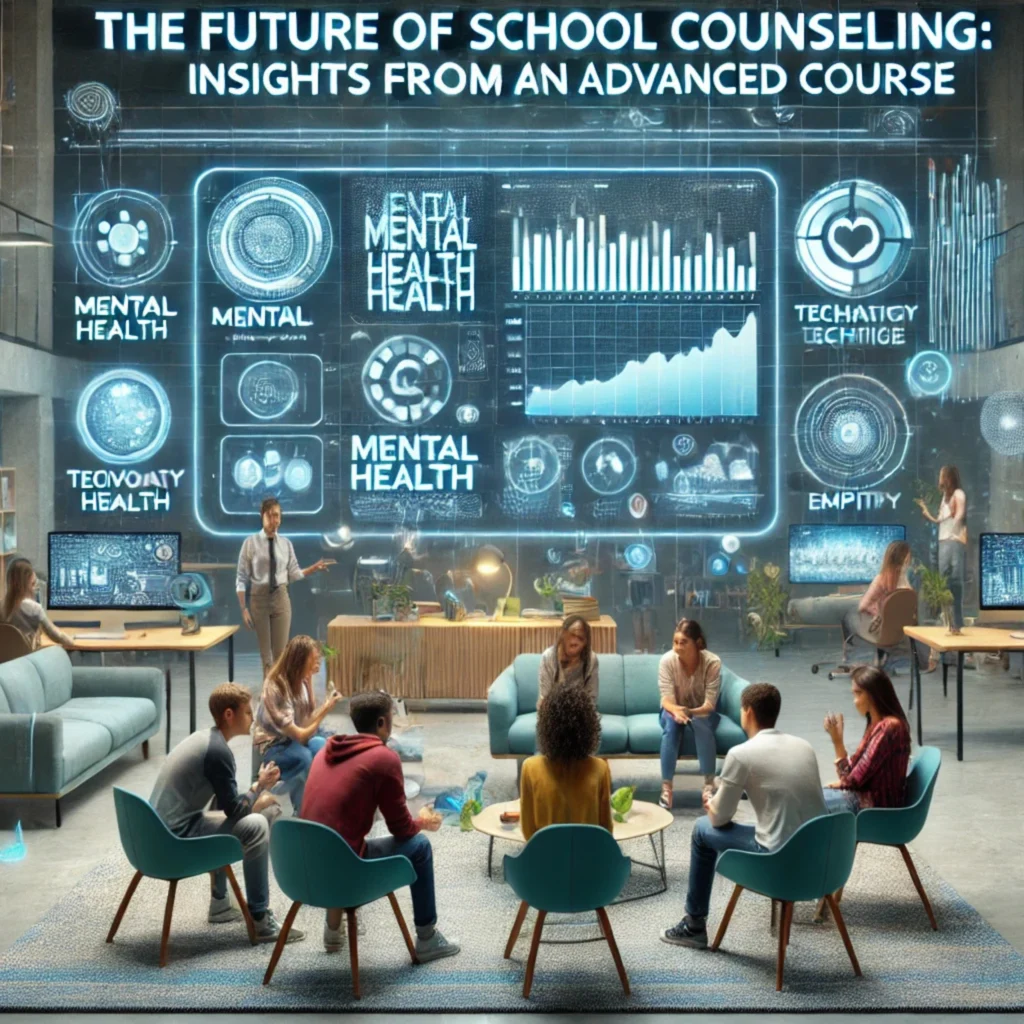
The Future of School Counseling: Insights from an Advanced Course
The field of school counseling is at a pivotal point of transformation. As education evolves to meet the changing needs of students and society, school counselors are finding their roles expanding in scope and complexity. With advanced training programs designed to address emerging challenges, the future of school counseling is becoming clearer, and its potential to positively impact students is more profound than ever.
This blog explores how advanced courses in school counseling are shaping the profession to meet the needs of tomorrow’s learners and the trends defining its future.
Gone are the days when school counselors were solely academic advisors or career planners. Today, they play a crucial role in nurturing students’ emotional, social, and mental well-being while also guiding them toward academic success. The modern school counselor acts as a bridge, connecting students to support systems that address challenges such as mental health issues, bullying, and family crises.
Advanced courses in counseling reflect these shifts, offering professionals tools to manage their expanding responsibilities. They also emphasize the importance of staying informed about emerging trends and adapting strategies to meet the unique needs of a diverse student body.
Key Drivers of Change in School Counseling
- Increased Focus on Mental Health:
Rising mental health concerns among students have made emotional and psychological support a top priority in schools. - Technological Advancements:
From tele-counseling to AI-driven tools, technology is reshaping how counselors interact with and support students. - Diversity and Inclusion:
Classrooms today are more diverse than ever, requiring culturally sensitive counseling approaches.
Career Pathways of the Future:
As industries evolve, students need guidance that goes beyond traditional career options, emphasizing adaptability and lifelong learning.

Advanced training programs equip school counselors with the knowledge and skills to address modern challenges effectively. Here are some of the key takeaways from such courses:
1. A Holistic Approach to Student Well-Being
Advanced courses emphasize the need for a holistic perspective, integrating academic, emotional, and social dimensions into counseling practices. Frameworks like the ASCA (American School Counselor Association) model guide counselors in developing comprehensive programs that support all aspects of a student’s development.
2. Using Technology to Enhance Counseling
Technology plays an essential role in modern school counseling, enabling professionals to:
- Conduct virtual counseling sessions to reach students who may not access support in person.
- Use data analytics to track trends in attendance, grades, or behavior, identifying early signs of student distress.
- Explore digital tools for social-emotional learning, such as gamified activities or apps designed to build resilience.
3. Addressing Mental Health Proactively
Advanced courses prepare counselors to handle issues like anxiety, depression, and trauma. This includes training in cognitive-behavioral techniques, mindfulness practices, and trauma-informed care that counselors can apply to create a supportive school environment.
4. Prioritizing Diversity, Equity, and Inclusion (DEI)
Cultural competence is a core focus of advanced training programs. Counselors learn to:
- Recognize and address systemic barriers that impact student success.
- Adapt their communication styles to respect cultural differences and avoid biases.
- Advocate for inclusive policies within schools to create equitable opportunities for all students.
5. Preparing Students for a Complex World
Guiding students in a world of constant change requires forward-thinking strategies. Advanced courses emphasize:
- Career counseling that incorporates non-linear career paths, entrepreneurship, and interdisciplinary skills.
- Programs to build essential skills like problem-solving, teamwork, and adaptability.
- Collaborations with businesses and community groups to provide hands-on learning opportunities.
1. Data-Driven Counseling
The use of data in decision-making is becoming increasingly important. By analyzing patterns in attendance, performance, and behavior, counselors can identify students who need intervention and measure the impact of their support programs.
2. Artificial Intelligence in Counseling
AI tools are emerging as a way to provide additional support. Chatbots and automated platforms can handle basic queries or perform mental health check-ins, freeing up counselors for more intensive work. However, training programs emphasize ethical considerations, particularly regarding privacy and data security.
3. Social-Emotional Learning (SEL)
As schools adopt SEL frameworks, counselors are taking the lead in teaching skills like empathy, emotional regulation, and effective communication. This focus ensures students are equipped to handle personal and interpersonal challenges.
4. Collaboration with Stakeholders
Counselors are increasingly working alongside teachers, administrators, parents, and external professionals to build a support system around students. Advanced programs teach counselors how to foster these partnerships effectively.
5. Advocacy and Leadership Roles
Modern counselors are stepping into leadership positions, driving systemic changes in their schools. Whether advocating for mental health resources or promoting DEI initiatives, they are becoming key players in shaping school culture.
Despite the promising developments, school counselors face significant challenges, including:
- Limited Resources: Many schools lack sufficient funding or personnel to implement comprehensive counseling programs.
- Burnout: The expanding responsibilities of counselors can lead to stress, underscoring the importance of self-care and time management strategies emphasized in advanced courses.
- Resistance to Innovation: Some schools struggle to adopt new technologies or methodologies, requiring counselors to act as change agents to overcome these barriers.
The future of school counseling is bright but demands adaptability and innovation from professionals in the field. By embracing technology, advocating for inclusive practices, and addressing mental health challenges proactively, school counselors can transform education systems to meet the needs of every student.
Advanced training programs play a crucial role in preparing counselors for these responsibilities. By equipping them with cutting-edge tools and knowledge, these courses ensure counselors can rise to the occasion, fostering environments where students thrive academically, emotionally, and socially.
The work of a school counselor has never been more critical, and with the right preparation, the impact they can make is boundless. Whether you are a counselor, an educator, or someone passionate about the future of education, the advancements in this field offer hope for stronger, healthier school communities.
As school counseling evolves, professionals must stay ahead of trends to make the greatest impact. Investing in advanced education is not just a career move but a commitment to empowering the next generation. The future of school counseling is filled with opportunities, and the time to prepare for it is now.

3 Comments
8 Steps to Make Mornings Less Anxious and More Peaceful - indiancounsellingservices.in
November 29, 2024[…] 1. Set Yourself Up for Success the Night Before […]
Diploma in Child Psychology - Indian Counselling Services
November 29, 2024[…] The Journey to Understanding Young Minds: Pursuing a Diploma in Child Psychology […]
Rewiring the Mind: How Addiction Reshapes Brain Function
December 11, 2024[…] 1. Medication-Assisted Treatment (MAT) […]